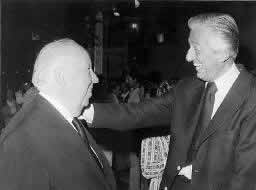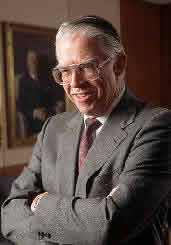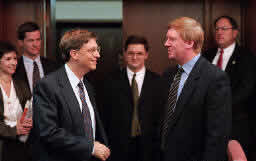| |
|
|
| |
 |
 |
The
Best CEO's ...7/30/2003 |
| |
There
are literally thousands with the title, But only
a few who are genuinely great at this increasingly
demanding job. Here's how Worth identified the
50 best.

It is testimony
to the rising importance and visibility of the
CEO that there's no longer any need to explain
what these quintessentially businesslike initials
stand for. The image of the CEO has taken its
lumps during the past few decades. In the 1970s,
the CEO was a bumbling bureaucrat who couldn't
even build a car that would stay in one piece.
In the 1980s, the CEO was a rapacious plunderer,
vilified for laying off honest folk just to acquire
a more lavish jet. But today, CEOs are popularly
regarded as a new celebrity class--even a nouveau
aristocracy. Not so much as captains of industry
but as wealth creators. Innovators. Visionaries.
The modern CEO-- including the most nerdy among
them--even has sex appeal.
The rising popularity
of investing, of course, has made CEOs more prominent
as public figures. If they don't know it to begin
with, shareholders quickly learn that a CEO's
decisions and pronouncements can have a profound
and often sudden impact on the value of their
holdings. Fortunes can be made or lost in an instant.
It's a relationship certain to create both heroes
and goats.
The stories that follow
focus on the heroes: 50 CEOs who shine for what
they have accomplished to date and who, Worth
believes, stand the best chance of excelling well
into the future. The 50 leaders are anything but
uniform in philosophy or personal style. There's
Michael Eisner, Disney's flashy micromanager.
And also Bob Kierlin of Fastenal, who wears hand-me-down
suits and claims to make no more than four big
decisions a year. There's IBM's aloof and distinguished
Louis V. Gerstner Jr. And Continental's motorcycle-riding
rock and roller, Gordon Bethune. Koichi Nishimura,
a Buddhist (and ex-football player), has infused
Solectron with a culture that values relationships
and attention to detail. Dennis Kozlowski of Tyco
is a strategic deal maker. And, of course, there
are Michael Dell, Bill Gates, Steve Jobs, and
several others who have masterminded the ongoing
revolution in the way all of us work and communicate.
S Diverse as they are, however, the Worth 50 also
all share certain key traits: integrity, vision,
an ability to focus, a willingness to take strategic
risks, and an unwavering belief in themselves
and their companies (as demonstrated by their
willingness both to reinvest corporate resources
and to tie their personal fortunes to their enterprises).

First, a reporting
team contacted a hundred of Wall Street's sharpest
analysts in search of nominations. Essentially,
each analyst was asked: "If you had to entrust
your personal nest egg to just one or two CEOs,
whom would you give it to?" Next, Worth investigated
the performance of each CEO within the context
of his (or her) industry, the executive's ongoing
commitment to the business (as measured by things
such as capital spending, research and development,
and marketing expenses), the company's short-term
and long-term prospects, and its over-all behavior
as a socially responsible organization (a sign
of enlightened management). An especially promising
executive could make the list even without a long
tenure as CEO--so long as the candidate had already
played a major role in a company's success.

One note:
Many readers will wonder why Jack Welch, the famed
CEO of General Electric, does not appear in the
following pages. In Welch's case--and a number
of others--the deciding issue was age. As a consistent
advocate of long-term investing, Worth wanted
to identify the CEOs most likely to build value
for their shareholders for many years to come.
Therefore, no CEO who is older than 60 appears
on the list. Sorry, Jack.
|
| |
|
|
|
|
|